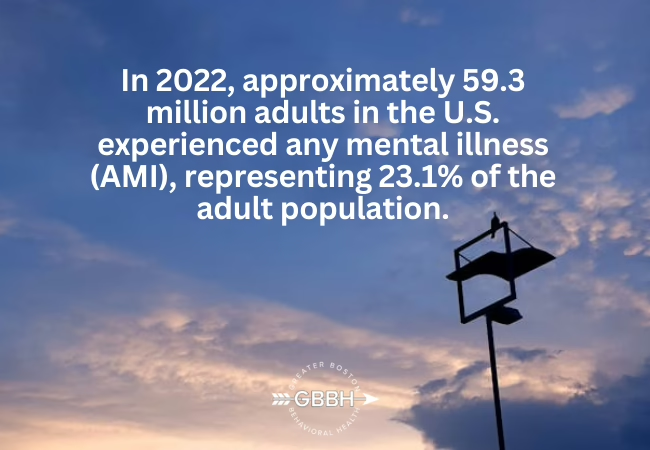Mental health is just as important as physical health, yet many people hesitate to seek professional support due to stigma, uncertainty, or the belief that they should be able to manage on their own. However, untreated mental health challenges can escalate, affecting relationships, work, and overall well-being.
At Greater Boston Behavioral Health, we believe that seeking professional help is a sign of strength. Whether you’re experiencing anxiety, depression, trauma, or emotional distress, recognizing when to seek support is the first step toward healing. Our Mental Health Treatment Center in Boston offers comprehensive therapy programs, inpatient treatment, and outpatient care to support individuals on their journey to recovery.
This guide will help you identify the signs that indicate you may need professional mental health support, explore treatment options available, and understand the importance of early intervention.
Why Recognizing Mental Health Struggles Early is Important
Many people believe that mental health conditions only require professional intervention when they reach a crisis point. However, early detection and treatment can prevent issues from worsening and significantly improve long-term outcomes.
Ignoring mental health warning signs can lead to:
- Increased stress and emotional distress
- Struggles with work or school performance
- Relationship difficulties
- Increased risk of substance abuse
- Physical health problems related to stress and anxiety
- More severe mental health conditions that require intensive care
Seeking help as soon as you notice persistent symptoms can lead to better emotional resilience, improved coping skills, and an overall higher quality of life.
Signs You May Need Professional Mental Health Support
It’s natural to experience stress, sadness, or anxiety from time to time, but if these feelings persist or worsen, it may be time to seek behavioral health services. Here are some key signs that indicate professional help may be beneficial.
1. Persistent Feelings of Sadness, Anxiety, or Hopelessness
If you feel overwhelmed with sadness, emptiness, or numbness that doesn’t go away, or if excessive worry, fear, or panic attacks disrupt daily life, it may indicate an underlying mental health condition. Feelings of hopelessness that persist even during positive life events are also red flags.
Anxiety and depression are treatable conditions, but without proper therapy, they can become more severe. Cognitive Behavioral Therapy (CBT) and Dialectical Behavior Therapy (DBT) are proven methods to help individuals develop healthier coping mechanisms and shift negative thought patterns.
2. Difficulty Managing Stress and Daily Responsibilities
Stress is a normal part of life, but when it becomes overwhelming and makes everyday tasks feel unmanageable, it may be a sign of burnout or a mental health disorder. If you find yourself feeling constantly fatigued, unable to concentrate, or struggling with motivation, it might be time to consider professional support.
Chronic stress can impact both mental and physical health. Treatment options like an Intensive Outpatient Program (IOP) or Partial Hospitalization Program (PHP) provide structured support to help manage stress effectively.
3. Sudden Changes in Mood or Behavior
If you experience frequent mood swings, irritability, or anger outbursts, or if you withdraw from friends, family, or activities you once enjoyed, these could be indicators of depression, bipolar disorder, or trauma-related conditions. Unexplained changes in appetite, sleep, or energy levels can also signal a mental health concern that requires professional attention.
Mental health therapy programs can help individuals regain emotional balance and stability by addressing the root causes of these behavioral shifts.
4. Increased Use of Unhealthy Coping Mechanisms
Turning to alcohol, drugs, excessive eating, or other destructive behaviors to manage emotions can be a sign of an underlying mental health issue. If you find yourself relying on unhealthy coping mechanisms to numb emotions or escape stress, professional intervention can help.
Substance use often coexists with mental health conditions, and behavioral health programs in Boston offer integrated treatment approaches to address both issues simultaneously.
5. Difficulty Coping with Grief, Trauma, or Major Life Changes
Major life events such as the loss of a loved one, a breakup, job loss, or financial struggles can trigger emotional distress that lasts beyond the initial shock. If you find yourself struggling to process grief, experiencing PTSD symptoms, or feeling emotionally numb, professional therapy can help you navigate these challenges.
Trauma-focused therapy, including Trauma Therapy Programs or Residential Treatment Programs, provides specialized care to help individuals work through past experiences in a safe and supportive environment.
6. Struggles with Self-Worth and Negative Thoughts
If you frequently feel worthless, unlovable, or like a burden to others, or if you engage in self-criticism, self-doubt, or negative self-talk, therapy can help reshape these thoughts into healthier perspectives.
Persistent thoughts of self-harm or suicide require immediate professional intervention. You are not alone, and there are professionals who can support you. Contact a Mental Health Treatment Center in Boston or reach out to emergency crisis services.
If you are in crisis, call the National Suicide Prevention Lifeline at 988 for immediate support.
Types of Mental Health Treatment Programs Available
If you recognize one or more of these signs, seeking professional mental health support can help you regain stability and wellness. At Greater Boston Behavioral Health, we offer a range of treatment programs to meet individuals at any stage of their recovery journey.
1. Inpatient Treatment Program
- 24/7 care and supervision in a structured environment
- Ideal for individuals experiencing severe depression, anxiety, or crisis situations
- Provides intensive therapy, medication management, and holistic support
2. Residential Treatment Program
- A long-term recovery option for those needing structured care without hospitalization
- Includes individual therapy, group therapy, and holistic wellness practices
- Ideal for individuals with trauma, mood disorders, or ongoing emotional struggles
3. Partial Hospitalization Program (PHP)
- A structured day program that offers intensive therapy
- Allows individuals to return home in the evening while receiving daily mental health support
- Best suited for individuals transitioning from inpatient care or needing high-level support
4. Intensive Outpatient Program (IOP)
- A flexible therapy program that allows individuals to attend treatment while maintaining work or school responsibilities
- Focuses on developing coping skills, emotional regulation, and long-term wellness strategies
- Includes CBT Therapy, DBT Therapy, and group counseling
5. Outpatient Therapy and Mental Health Therapy Programs
- Ideal for individuals seeking long-term support without intensive care
- Includes one-on-one therapy, family therapy, and group therapy sessions
- Helps individuals manage stress, anxiety, depression, and trauma over time
To learn more about our mental health treatment programs in Boston, call Greater Boston Behavioral Health at (617) 307-3842.
Taking the First Step Toward Mental Wellness
Recognizing when you need professional mental health support is an important step toward healing. Whether you are experiencing persistent sadness, anxiety, or difficulty coping with daily life, seeking help from a Mental Health Treatment Center in Boston can provide the tools and resources you need to regain balance.
At Greater Boston Behavioral Health, we are committed to providing compassionate, evidence-based care to help individuals overcome mental health challenges.
Call Greater Boston Behavioral Health at (617) 307-3842 to speak with a professional about our inpatient, outpatient, and therapy programs in Boston. Your mental health matters—don’t wait to seek the help you deserve.
FAQ on Need Professional Mental Health Support
How do I know if I need professional mental health support?
If you experience persistent sadness, anxiety, mood swings, stress, or difficulty functioning in daily life, it may be time to seek professional help. Other signs include withdrawal from social activities, trouble managing emotions, or using unhealthy coping mechanisms like substance use.
What are the benefits of seeking professional mental health treatment?
Professional treatment can provide:
- Emotional support and coping strategies
- Therapy to address underlying issues like anxiety, depression, or trauma
- Structured programs such as IOP, PHP, and residential care for varying levels of support
What types of mental health treatment programs are available?
At Greater Boston Behavioral Health, we offer:
- Inpatient Treatment Program – 24/7 care for individuals in crisis
- Residential Treatment Program – Long-term support in a structured setting
- Partial Hospitalization Program (PHP) – Day treatment with evening flexibility
- Intensive Outpatient Program (IOP) – Therapy while maintaining work/school commitments
- Outpatient Therapy Programs – Ongoing mental health therapy and counseling
What if I’m not sure I need professional help?
If you’re unsure, speaking with a mental health professional can help determine the best course of action. Even if your symptoms feel mild, early intervention can prevent conditions from worsening.


